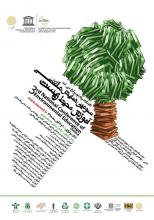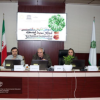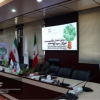The 3rd National Conference on Environmental Education was held as webinar (for the first time)
The 3rd National Conference on Environmental Education was held as webinar (for the first time) on Monday and Tuesday, 11 and 12 November 2019. This conference was held with the aim of creating a proper ground for exchanging scientific information and transferring the experiences of researchers. Developing and enhancing audience sensitivity and making creative about environmental change as well as promoting environmental awareness and public culture in the field of environmental protection are other aims of this conference. Keynote Speakers: Professor Seyed Mohammad Shobeiri Head of UNESCO Chair on Environmental Education and Secretary of the Conference: In the first speech, Professor Seyed Mohammad Shobeiri, Secretary of the Conference, explained that the aim of the conference “is to create and enhance community sensitivity about environmental issues”. He mentioned that the environment has three dimensions:
Then he briefed the session on the report of the environmental education conferences held previously in 2011 and 2017. He said: “The affairs related to the executive management and scientific management of the conference have been planned during the last 9 months. After obtaining the necessary permits from the Ministry of Science, Research and Technology, the conference was held as webinar to remove the geographical limitation, save time for participation in the conference and facilitate the realization of green management.” 75 papers were submitted to the conference, some were presented by the participants and some were presented as poster. Dr. Mohammad Ali Karimi Deputy of Research and Technology of Payame Noor University: Dr. Mohammad Ali Karimi put emphasis on the importance of environment and said: “considering that Payame Noor University focuses on blended and electronic learning, it has played a crucial role in developing green management and reducing the use of paper, especially through production of electronic books and electronic tests. This webinar promotes educational justice by making educational materials accessible to all participants from different parts of the country.” He added: “today, environment is one of the important concerns of the country. By development of new technologies and advancement of science, public attention has been drawn to to the environment, and today many countries are working to protect the environment.” He said: “I hope that the conference would facilitate beginning of a comprehensive education for all the people with the motto of “starting from ourselves and paying attention to the rights of others”, so that various social reforms for protection of environment and natural resources can be implemented at community level.” Dr. Hojatollah Ayoubi Secretary General of the Iranian National Commission for UNESCO: While expressing his satisfaction about organizing the conference as webinar, he called the participants’ attention to environmental literacy- as one of the criteria for literacy in terms of the UNESCO. He pointed out: “considering the importance of environmental protection in Iran's ancient culture and teachings of religion, environmental protection is, in fact, part of the Persian culture and organizing such conferences can facilitate promotion of literacy as well as policy -making in the field of environmental protection.” Dr. Arash Yousefi Head of the Center for Environmental Education and Department of Training of park rangers of Department of Environment: He said: “education plays an important role in solving environmental problems. In Department of Environment, emphasis is placed on promotion of environmental protection culture, in line with sustainable development goals. This Department also offers strategies for the higher education system of the country by providing the academic course on “understanding of environment” and by compiling the book of humans and the environment for high school students. Furthermore, measures have been taken for education of pre –school children. Given the central role of family in the development of environmental literacy, more emphasis has been placed on education for children and families.” Dr. Akbar Ranjbarzadeh Secretary of the board of directors of the Islamic Consultative Assembly: He said: “organizing the event as webinar can be an effective step in promotion of educational justice, because this event has provided an opportunity for participants from different parts of the country to share their educational materials”. He also referred to Payame Noor University, as a model for other universities in the realization of Green University and said: “elevating the status of the environment is an important issue and in this regard, environmental education provided by of UNESCO Chair at University of Payame Noor, plays an important role in development of environmental education.” Dr. Mohammad Birjandi Director General of the Department of empowerment of NGOs and Development of Social Participation (part of the Ministry of Interior): He spoke about environmental education and importance of social participation, with emphasis on the capacity of NGOs in development of environmental education at different levels of society. He said “community involvement of a society bears witness to its development and is rooted in social interests of the society. Participation is an important aspect of NGOs’ activities in the field of environment. Non-governmental Organizations, as institutions of social partnership, play an effective role in determining national and international diplomacies for the promotion of environmental laws by cooperating in the implementation of the project and providing consultation in policy –making. Voluntary activities are the best achievements of NGOs.” Dr. Sheena Ansari Director General of the Environment and Sustainable Development Department of Tehran Municipality: She said: “In accordance with paragraph 14 of the policies issued by the Supreme Leader, emphasis must be placed on promotion of environmental awareness. Also article 50 of the Constitution links current and future generations to the environment and makes it a public duty to protect the environment. Therefore, environmental education for the public is very important. In the laws passed by the parliament as well as the laws of the country, much emphasis is placed on environmental education. However, we are facing serious challenges and environmental education can be effective once we take necessary steps to decrease environmental degradation. Strengthening the willpower of people through environmental education and governmental policy –making can help us overcome challenges. This webinar promotes educational justice by making educational materials accessible to all participants from different parts of the country. Department of the Environment and Sustainable Development of Tehran Municipality has established a department for empowerment and has taken effective measures to encourage social participation and develop environment departments in Tehran.” |






